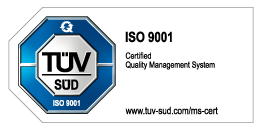Photo: Michael Garri
NEW ITEM 2024
Siemens Desiro HC Electric Powered Train
Art.No.: 25462
On 10 December, the innovative Siemens Desiro HC electric multiple-unit train celebrated its debut in the timetable change. This ultra-modern rail vehicle sets new standards in terms of efficiency, comfort and environmental friendliness. Equipped with the latest electric mobility technology, the Desiro HC not only offers a sustainable alternative in passenger transport, but also promises a pleasant travelling experience for passengers.
Desiro HC (HC = high capacity) is a modern commuter electric multiple-unit train developed and built by Siemens, which is available in four to six-car versions. The end carriages of these trains are single-decker, the centre carriages are double-decker. With a length of 105 metres, the four-car version offers a capacity of over 400 seats. Deutsche Bahn AG will be operating these vehicles on the Franconia-South Thuringia network on the following routes from the 2023/2024 timetable change:
- Regional express Nuremberg-Bamberg-Würzburg/Saalfeld
(on the Nuremberg-Bamberg section in double traction) - Regional express Nuremberg-Bamberg-Coburg/Saalfeld
(also in double traction on the Nuremberg-Lichtenfels section) - Bamberg-Kronach regional railway
(until June 2024 still in mixed traffic with the current vehicles)
Prototype
German Railroad, Inc. (DB AG) Siemens Desiro HC electric powered train as the class 1462/1862. One class 1462.0 end car, 2nd class, one class 1862.0 intermediate car, 2nd class, one class 1862.5 intermediate car, 2nd class, and one class 1462.5 end car, 1st/2nd class. The train is part of the Franconian-South Thuringian Network. Traffic red basic paint scheme. The train looks as it did starting in December of 2023.
Model
The train has a digital decoder and extensive sound and light functions. It also has controlled, high-efficiency propulsion with a flywheel, built centrally into End Car A. All four axles powered in both trucks using cardan shafts. Traction tires. The current supply changes over with the direction of travel and is picked up at the end car at the front of the train. There are special close couplers with a guide mechanism. Triple headlights and dual red marker lights change over with the direction of travel, will work in conventional operation, and can be controlled digitally. There is a double A light function. Long-distance headlights prototypically have two levels of brightness. They, the cab and control desk lighting as well as lighting for the train destination signs at the ends and on the sides can be controlled digitally. There is factory-installed LED interior lighting. A buffer capacitor is built into each car to bridge over temporary spots without current. The interior lighting receives current using the continuous electrical connection for the entire train. Maintenance-free warm white and red LEDs are used for all of the train's lighting. The interior details are multi-colored. The pantographs can be raised and lowered digitally. There are many separately applied details. The minimum radius for operation is 360 mm / 14-3/16". Length of the train approximately 112.6 cm / 44-5/16".
Highlights:
- Completely new tooling with highly detailed construction
- Factory-installed LED interior lighting with buffer capacitors
- Multi-color interior details
- Pantographs can be raised and lowered digitally
- Train destination sign lighting can be controlled digitally
- Long-distance headlights can be controlled digitally with two levels of brightness
- Cab and control desk lighting can be controlled digitally
- Many separately applied details
- Digital decoder with extensive light and sound functions
- DCC, mfx, and RailCom capable
RRP: 699,00 EUR
Siemens Desiro HC Electric Powered Train
Art.No.: 25463
Prototype
German Railroad, Inc. (DB AG) Siemens Desiro HC electric powered train as the class 1462/1862. One class 1462.0 end car, 2nd class, one class 1862.0 intermediate car, 2nd class, one class 1862.5 intermediate car, 2nd class, and one class 1462.5 end car, 1st/2nd class. The train is part of the Rhine Valley Network. Painted and lettered in the provincial design for Baden-Württemberg. The train looks as it did starting in 2020.
Model
The train has a digital decoder and extensive sound and light functions. It also has controlled, high-efficiency propulsion with a flywheel, built centrally into End Car A. All four axles powered in both trucks using cardan shafts. Traction tires. The current supply changes over with the direction of travel and is picked up at the end car at the front of the train. There are special close couplers with a guide mechanism. Triple headlights and dual red marker lights change over with the direction of travel, will work in conventional operation, and can be controlled digitally. There is a double A light function. Long-distance headlights prototypically have two levels of brightness. They, the cab and control desk lighting as well as lighting for the train destination signs at the ends and on the sides can be controlled digitally. There is factory-installed LED interior lighting. A buffer capacitor is built into each car to bridge over temporary spots without current. The interior lighting receives current using the continuous electrical connection for the entire train. Maintenance-free warm white and red LEDs are used for all of the train's lighting. The interior details are multi-colored. The pantographs can be raised and lowered digitally. There are many separately applied details. The minimum radius for operation is 360 mm / 14-3/16". Length of the train approximately 112.6 cm / 44-5/16".
RRP: 699,00 EUR


